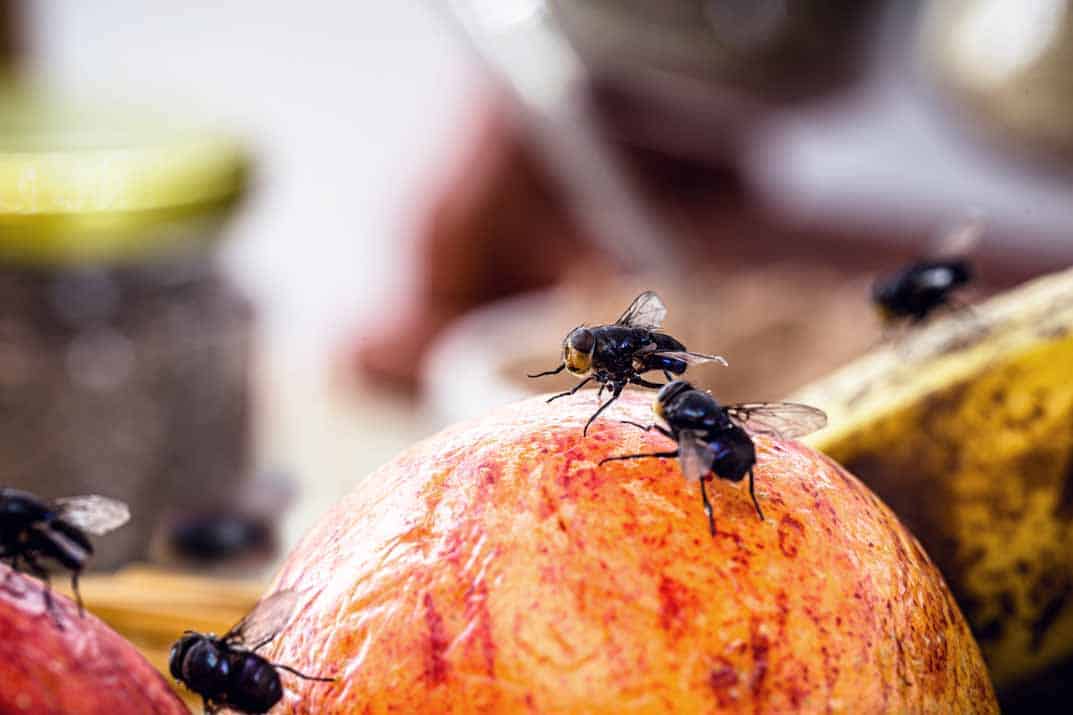If you’ve ever smacked a fly on your kitchen counter and thought, “At least it’s just annoying,” you might want to think again. Flies are more than a buzzing nuisance—they can carry and transmit a variety of pathogens that affect humans and pets. We’ve seen firsthand how overlooked flies can be when it comes to health risks. So, as your friendly neighborhood pest experts at Wake Pest here in Raleigh, we’d like to shed some light on the diseases flies can spread and what you can do to protect your family.
How Flies Transmit Diseases
Many fly species land on filthy surfaces—think dumpsters, animal waste, or dead animals. Because flies have sticky hairs on their legs and bodies, they pick up pathogens from these dirty surfaces. When they land on your kitchen counter or on your food, they can deposit these germs and potentially cause illness.
Flies don’t just transmit pathogens externally. Some species regurgitate saliva or defecate as they move around, further increasing the spread of bacteria or viruses. It’s not a pleasant thought, but it’s important to be aware of how these critters operate.
Common Diseases Carried by Flies
While not all flies carry every disease, here are some common pathogens associated with various fly species:
- Salmonella: Linked to food poisoning, causing symptoms like diarrhea, fever, and abdominal cramps.
- E. coli: Certain strains can cause severe stomach cramps, bloody diarrhea, and vomiting.
- Cholera: Though less common in the U.S., cholera can spread through contaminated water or food.
- Dysentery: Causes inflammatory disorders in the intestine, leading to diarrhea with blood.
- Typhoid Fever: Can lead to high fever, weakness, and abdominal pain.
According to the Centers for Disease Control and Prevention (CDC), flies are known to transfer over 65 different human diseases. While not every fly in Raleigh is carrying a deadly pathogen, the risk exists whenever they land on your food or cooking surfaces.
The Role of House Flies vs. Other Fly Species
House flies (Musca domestica) are the most common culprits for transmitting these diseases because they frequent both indoor and outdoor environments. However, other species like blow flies or flesh flies can be equally hazardous if they come into contact with food or surfaces where you prepare meals.
Fruit flies, while more often a nuisance than a serious health threat, can still transfer yeasts and other microbes from fermenting fruits to your kitchen surfaces.
Who’s Most at Risk?
While anyone can get sick from pathogens carried by flies, certain groups are more vulnerable:
- Young Children: Their immune systems are still developing, making them more susceptible to infections.
- Older Adults: As we age, our immune systems can weaken, increasing the risk of complications.
- Individuals with Compromised Immune Systems: Those undergoing chemotherapy, living with HIV, or on immunosuppressive medications have a harder time fighting off infections.
Pets can also be affected by pathogens carried by flies, experiencing gastrointestinal issues or worse.
Prevention Tips for a Healthier Home
The good news is that minimizing the risks flies pose to your family’s health is fairly straightforward if you practice consistent hygiene and pest-prevention strategies. Here’s what we suggest at Wake Pest:
- Keep Surfaces Clean: Wipe down countertops before and after food preparation. Use a disinfectant, especially if you suspect a fly landed there.
- Store Food Properly: Keep all food in sealed containers or in the refrigerator. This includes fruits and vegetables, which often attract fruit flies.
- Dispose of Trash Correctly: Use a trash can with a tight-fitting lid and empty it regularly—especially during warm months.
- Check and Repair Screens: Ensure there are no holes or tears in window and door screens to keep flies from entering in the first place.
- Use Traps and Baits: Set up traps in high-traffic areas, like near trash cans or in the kitchen, to catch flies before they multiply.
Why Raleigh Homes Need Extra Vigilance
North Carolina’s warm climate and humidity create an ideal environment for flies to breed. According to local health department reports, there’s an uptick in reported foodborne illnesses during the hotter months when fly activity peaks. If you enjoy outdoor barbecues or have a lush backyard garden, you’ll want to pay extra attention to waste disposal and hygiene practices.
Our team often finds that small changes—like keeping a lid on your compost bin or installing a screen door—can drastically cut down on fly-related issues.
Professional Insight on Disease Prevention
Here at Wake Pest, we emphasize that pest control and disease prevention go hand in hand. When we inspect a property, we look for:
- Common fly attractants (garbage, pet waste, standing water)
- Possible entry points (gaps under doors, torn screens, cracks in siding)
- Indoor factors (dirty dishes, spilled food, inadequate sanitation)
By addressing these issues, you don’t just reduce the number of flies—you also reduce the likelihood they’ll spread anything harmful. For families with young children or older adults, we often recommend additional measures like installing self-closing doors or using air curtains (in commercial settings) to keep flies out.
How We Can Help
If you’re dealing with a fly infestation or want to take preventive steps to keep your family healthy, Wake Pest offers comprehensive inspections and treatments. We tailor our approach to your unique needs—whether that’s a one-time treatment or an ongoing plan to safeguard your home year-round. Our goal is simple: give you peace of mind so you can enjoy your home without worry.
Final Thoughts
Flies might look harmless, but they can pose a genuine health risk if they’re buzzing around your kitchen or lounging on your food. By understanding the diseases they can carry and taking proactive steps to prevent infestations, you can significantly reduce the risk to your family. Remember, a clean home and proper food storage are your first lines of defense.

